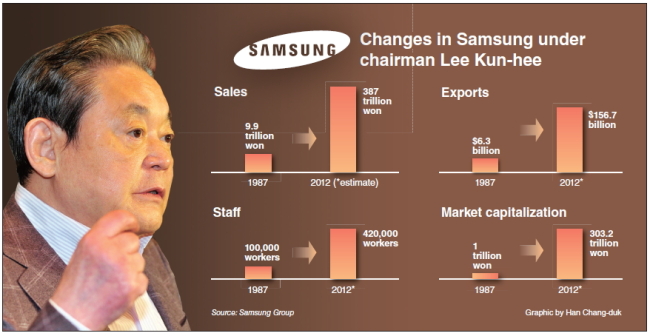Lee’s leadership, innovative thinking behind Samsung’s 25 years of growth
Chairman marks 25 years as head of Samsung, which has grown to be a leading global conglomerate
By Kim Yon-sePublished : Nov. 21, 2012 - 22:07

Samsung Electronics chairman Lee Kun-hee had said one genius can feed millions of others, stressing the significance of creativity of employees.
“We have to hire the best. A genius person is worth more than $1 billion,” said Lee, who has been leading Samsung Group since 1987.
As the third son of Samsung founder Lee Byung-chull, the 70-year-old business leader had instructed his staff to “change everything except your wife and kids.”
While Samsung Group in the late 1980s was overly focused on mass producing low-quality goods and unprepared to compete in quality, its several subsidiaries have grown since then as the world’s representative enterprises.
This year, Samsung Electronics was included on the list of the world’s 10 most valuable brands selected by Interbrand, the world’s leading brand management consultancy.
Among other Notable Samsung units are Samsung Heavy Industries, the world’s second-largest shipbuilder, Samsung Engineering & Construction, Samsung C&T and Samsung Techwin.
Lee Kun-hee’s assertive and charismatic leadership of Samsung Electronics allowed the company to be quicker and more decisive in adapting to market changes and exploiting new opportunities than its Japanese rivals.
Many economists share the view that Samsung stimulated and compensated employee efforts by distributing profits to them as incentives.
“Samsung’s hungry, can-do spirit also contributed to making it a leading global technology company as employees have willingly dedicated their time and energy to its development,” said Korea University professor Chang Sea-jin.
The market cap of Samsung Electronics stands at 198.55 trillion won ($180 billion), outpacing Toshiba, which registers 16.59 trillion won.
The chairman prioritizes development of high-end technologies and updated designs.
One of the factors behind the success of Anycall is an emphasis on product designs.
Samsung Electronics’ mobile phones, known as simply Samsung in most overseas markets, helped the company to promote an image as a business with cutting-edge technology.
When the company designed the SGH-600 model for the European market in 1999, it did not follow the classic design of models popular in the local market, but settled for a simpler, geometrically balanced design that Europeans ended up favoring.
In contrast to Samsung’s earlier designs for Europe, the model was a major hit and sold more than 10 million units.
The flip cellular phone with an external LCD display that was released in 2000 and the “Drama Phone” for women are cases of how the company’s forward-looking management have led to greater revenue and brand value.
As Lee has taken on a senior member of the International Olympic Committee, Samsung Electronics also has promoted sports marketing to upgrade its image as a high-tech communications company since the 1998 Nagano Winter Olympics.
It pushed aside Motorola to win the communications slot as The Olympic Partner, or TOP. In addition to being a sponsor, Samsung took on the responsibility of supplying wireless technology at the Winter Olympics.
The group’s marketing and technological resources were wholly focused on Anycall then.
The company has also been involved in hosting sporting events such as the Samsung Nations Cup, an equestrian event held mostly in Europe, and star marketing, of which LPGA champion Pak Se-ri is a prime example.
Strength of human capital Samsung Group recognized the importance of securing talented human resources early on, regardless of an employee’s nationality. The conglomerate is also credited with starting a tradition in Korea to send employees abroad for further education at the company’s expense.
“In the early 1980s, it was unusual for a business to send an employee abroad to further study his or her specialty area,” Samsung Electronics president in charge of system LSI, Lim Hyung-kyu, said. Lim was the first Samsung employee sent abroad for continuing education.
The group started scouting foreign talent about 30 years ago when it hired Japanese advisors as a shortcut to learning the latest technologies. Samsung’s management, including the chairman, is reputed for making strenuous efforts to secure talented staff.
Currently, about 500 foreigners work for Samsung, including more than 200 Japanese and about 90 Russians. Chairman Lee is also known for his active involvement in recruiting.
Lee has a degree in economics from Waseda University in Tokyo and attended an MBA course at George Washington University in the U.S. in 1966 without earning a degree. He speaks Korean, English and Japanese. In 1996, Lee became a member of the International Olympic Committee. He has an estimated net worth of $7.4 billion.
By Kim Yon-se (kys@heraldcorp.com)



![[Herald Interview] 'Amid aging population, Korea to invite more young professionals from overseas'](http://res.heraldm.com/phpwas/restmb_idxmake.php?idx=644&simg=/content/image/2024/04/24/20240424050844_0.jpg&u=20240424200058)












![[KH Explains] Korean shipbuilding stocks rally: Real growth or bubble?](http://res.heraldm.com/phpwas/restmb_idxmake.php?idx=652&simg=/content/image/2024/04/25/20240425050656_0.jpg&u=)

